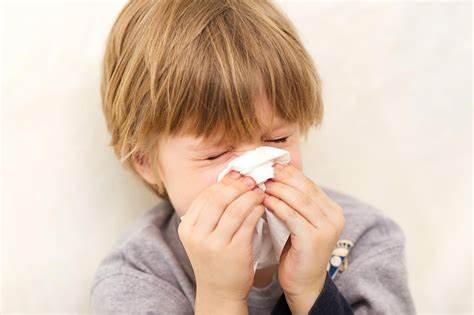As we inch closer to winter, we begin to see an uptick in calls and concerns regarding coughs and respiratory infections. While common, it is important to know what to expect, how to manage them, and when to call the doctor.
Many respiratory infections begin with mild symptoms – runny nose, postnasal drip, a cough here and there. For some, those mild symptoms will eventually go away. For others, they may worsen. The coughing and congestion can begin to interfere with eating, daily activities, and sleep. So, what do we do?
Mild coughs/symptoms

If your child is fever-free and has decent energy, most coughs and upper respiratory infections can be managed at home. Clearing nasal passageways with saline spray and a bulb syringe or Nose Frida (for babies/toddlers) or by blowing the nose is a good place to start. Warm liquids, honey (for children over 1 year old), steamy showers, and a cool mist humidifier while sleeping can help lessen the severity of the coughing. Elevating the head of the bed while sleeping may help as well. For infants, you can roll a towel and place it underneath the mattress in the crib – this way the head is elevated while also maintaining a safe sleep environment.
We do not recommend the use of over-the-counter cough syrups because they are rarely effective and there are many additives that are unnecessary.
Coughs can linger up to three weeks or longer. If your child has had a cough for a few weeks with no other symptoms and you’ve tried home remedies, give us a call and we can evaluate them in the office.
What if the cough/symptoms worsen?
If a cough is accompanied by a fever, lethargy, wheezing or respiratory distress, your child should be evaluated by a medical professional. Similarly, if your child has had mild symptoms for a few weeks and suddenly symptoms worsen or a cough becomes constant and more pronounced, we should see them to listen to the lungs. On occasion, what starts out as a mild virus can lead to a secondary infection like pneumonia.
If your child has a barking, seal-like cough, it may be Croup. Croup can typically be managed at home with steamy showers, a cold blast of air from the outdoors or freezer, and clear liquids. If your child’s breathing becomes labored or they begin to belly breath, they should be seen right away. On occasion, Croup requires steroid intervention. For most children, Croup will be worse overnight and clear after about three days with home management.
Prevention and return to school

To avoid coughs/colds, encourage excellent hand-washing and avoid spending time around individuals who are sick. If your child is symptomatic, remind them to cough/sneeze into their elbow and wash their hands frequently. Masking may be appropriate in some cases and staying home is always a good idea as well. Most children can return to school when symptoms have improved and they have been fever-free without fever-reducing medication for at least 24 hours.
If your child has asthma, make sure to follow your asthma action plan when symptoms start. If you are unsure about what the plan is or need a copy of it for school or daycare, please let us know.
Stay healthy! And as always, call us anytime with questions/concerns.
Leave a comment